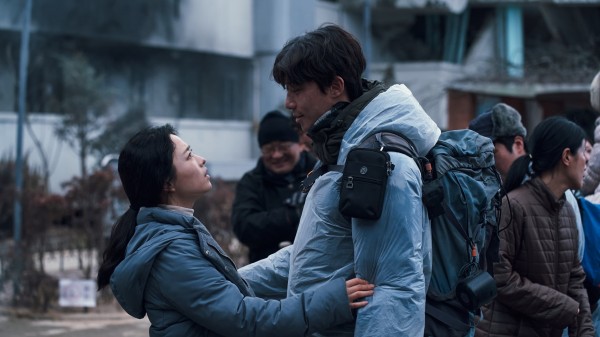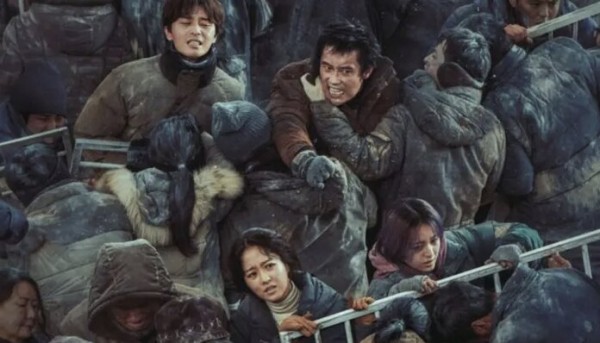 PARK BO-YOUNG AND PARK SEO-JUN IN CONCRETE UTOPIA Stay-at-homesConcrete Utopia
PARK BO-YOUNG AND PARK SEO-JUN IN CONCRETE UTOPIA Stay-at-homesConcrete Utopia, Korea's candidate for the Best Foreign Oscar this year, is an interesting but unwieldy movie. It's open to different interpretations and each review takes a different tack. That may seem good, but it also means we don't altogether know what we're dealing with. Some things don't quite compute. But the action is so audacious and epic, the filmmaking so ambitious, that most of the time it hardly matters. (Later, I will express some doubts, though.)
What we can agree on is that at the outset there is a terrible earthquake, and all of Seoul is destroyed. All that survives, as far as anyone can see, is one new apartment complex with sevral hundred residents. The rest is rubble. The apartment building is called the Hwang Gung apartments (Imperial Palace Apartments), and it looks "like a giant hotel, with two 30-story rectangular wings meeting in a circular pivot at the center" as Owen Gleiberman describes it in his
Variety review ("'Earthquake’ Meets 'Lord of the Flies'"). People from other, destroyed dwellings wander in and ask for shelter, and residents accept them - at first.
But then it becomes clear that there won't be enough of anything to go around. Furthermore, this is the home of the residents, not of anyone else. A leader they call the "delegate," Kim Young-tak (Lee Byung-hun in a fantastic role), is chosen on the basis of his single-handedly putting out a big fire in a downstairs apartment. A secret ballot is staged using pebbles to decide on the outsiders and they are brutally ousted and a fence erected to keep them out. The residents organize into a system. As Ross McIndoe of
Slant describes, they form into groups to deal with tasks "from food distribution to medical care to waste management," and are presented in Wes-Anderson-esque tableaux that are amusing and a bit unsettling. People are given weekly supplies according to how much they contribute (has somebody been reading Marx?), and those who can't or won't work hard for the whole may get a roll of toilet paper but not much food. (Mightn't this choosiness be more trouble than it't worth?)
Kim Young-tak becomes sexy and also sinister, walking into people's apartments at night unannounced and seizing people like the Gestapo. He leads brutal foraging groups that attack wandering non-resident survivors. In at-home rallies, he leads chants celebrating the dominance and superiority of residents. Hurray for the Wang Gung apartments! We begin to see why it's in the ether to call this film an offshoot not only of "the webtoon "Pleasant Bullying" by Kim Soongnyung," as Rafael Motomayor of
SlashFilm explains it expands on greatly, but in a very general but important way of William Golding - only it's much more on an epic scale and all feels really worse because there are so many people and it's such a confined world, a world of "concrete" - with the word "utopia" distinctly ironic.
The irony deepens when midway the movie dives into the devious secret background of Kim Young-tak, a hero not of a thousand faces but at least several who turns out not to be who he says, as is revealed by Hye-won(Park Ji-hu), who's allowed in as a new resident because (as Sara Merican puts it in her
BFI review) she's "the accidental child" of a love affair between a resident and non-resident. She was there before where Hye-won Park is now living and knows he doesn't even belong there.
In addition to Kim Young-tak, there are two other important characters, Min-sung (Park Seo-joon, of
The Marvels) and Myung-hwa (Park Bo-young), a gentle couple with benevolent impulses; he’s a civil servant, she’s a kindly, quietly empathetic nurse. But in the pressure of this post-apocalyptic world, their unity, symbolic of everyone's, will be destroyed.
Merican calls
Concrete Utopia"a moralizing disaster movie," but that may be misleading. Gleiberman takes pains to point out how this is, in a way, the opposite of moralizing, unusual for a genre picture in leaving it up to us to decide what we think of the main characters. Things may be less open ended, howevrer, when we learn some corpses are disappearing because certain residents are indulging in cannibalism to survive. There is little evidence of much exploration outside the building till the last couple of reels, when there is some intense, chaotic devolution, and finally a puncturing of the whole idea of a safe haven in the middle of a vast disaster. This last segment is a grand mess. But the last few minutes have a curiously healing effect.
Ugly, violent, exciting, convoluted,
Concrete Utopia is an apocalyptic epic that's troubling and thought-provoking enough to make it transcend genre and justify, perhaps, the Oscar submission. The movie is so ambitious that sometimes it feels as if Um Tae-hwa and his co-writer Lee Shin-ji have bitten off more than they can chew (perhaps an untoward phrase given what was just revealed). It may give viewers a lot to chew on. A major contributor is cinematographer Cho Hyoung-rae; Kim Hae-won's score does a lot to keep things lively too. Whatever the shortcomings of the writing, this is a full-bore cinema industry in operation.
The blatant artificiality of the basic setup is obvious. It's hard to believe a single building would remain intact when all the rest was rubble, and it's a big gap for most of the rest of the citizens of Seoul to be left nameless and nearly invisible. But that's the point: the screenplay is hiding a lst minute reveal that puts everything that's come before in perspective. The movie throws out all kinds of hints but the situation is too complicated to fully develop in only a little over two hours.
This is also doubtless a movie about the need for home, but that theme gets too lost in the violent action to gather full emotional resonance. The opening of the movie - Gleiuberman explains this particularly - focuses more on the city's growing enthusiasm for apartment living than on the apocalyptic disaster that starts things off, which is only briefly, if deftly, sketched in. Maybe the ultimate "lesson" of
Concrete Utopia is that social organization is only skin deep. Or is it? This is a movie that goes in too many directions. But while it's doing so it manages to hold our attention. It's likely to acquire an enthusiastic fan base, like
Snowpiercer. Even if it's not as much fun or as neatly constructed as Bong Joon Ho's movie of a decade ago, it's more thought-provoking.
Concrete Utopia 콘크리트 유토피아 ("Konkeuriteu Yutopia") 130 mins., opened in numerous Asian markets in Aug. and Sept. It also spread its wings at various festivals in Oct. and Nov. It opens limited in the US Dec. 8, 2023, and wider Dec. 15.
 OUSTED NON-RESIDENTS IN CONCRETE UTOPIA
OUSTED NON-RESIDENTS IN CONCRETE UTOPIA




